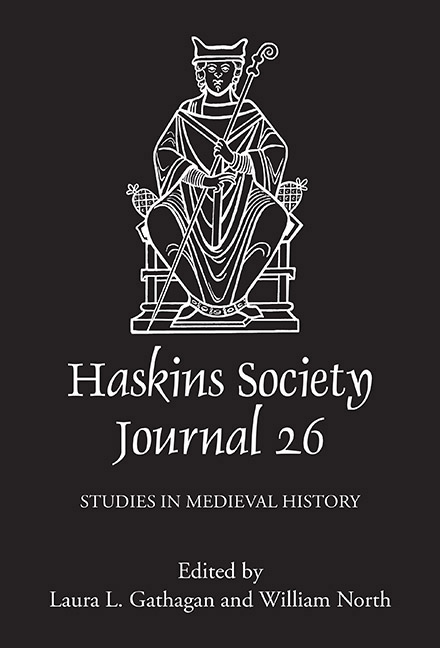Book contents
- Frontmatter
- Contents
- List of Figures
- Editors’ Note
- Abbreviations
- 1 Mores Tuos Fabricae Loquuntur Building Activity and the Rhetoric of Power in Ostrogothic Italy
- 2 A Hermeneutical Feast: Interreligious Dining in Early Medieval Conciliar Legislation
- 3 A Hypothetical Slave in Constantinople: Amalarius’s Liber Officialis and the Mediterranean Slave Trade
- 4 Welsh Kings at Anglo-Saxon Royal Assemblies (928–55)
- 5 The Diplomatics of Depredation: Reconsidering Holy Trinity Caen’s List of Losses
- 6 When Did Robert of Torigni First Receive Henry of Huntingdon’s Historia Anglorum, and Why Does It Matter?
- 7 A Coin Bearing Testimony to Duchess Matilda as Consors Regni
- 8 Fighting to be the Tallest Dwarf: Invidia and Competition in the Self-Conception of Eleventh- and Twelfth-Century Masters
- 9 Brut y Tywysogion: the History of the Princes and Twelfth-Century Cambro-Latin Historical Writing
- 10 The Use of English Annalistic Sources in Medieval Welsh Chronicles
- 11 A Franco-Danish Marriage and the Plot against England
8 - Fighting to be the Tallest Dwarf: Invidia and Competition in the Self-Conception of Eleventh- and Twelfth-Century Masters
Published online by Cambridge University Press: 25 May 2021
- Frontmatter
- Contents
- List of Figures
- Editors’ Note
- Abbreviations
- 1 Mores Tuos Fabricae Loquuntur Building Activity and the Rhetoric of Power in Ostrogothic Italy
- 2 A Hermeneutical Feast: Interreligious Dining in Early Medieval Conciliar Legislation
- 3 A Hypothetical Slave in Constantinople: Amalarius’s Liber Officialis and the Mediterranean Slave Trade
- 4 Welsh Kings at Anglo-Saxon Royal Assemblies (928–55)
- 5 The Diplomatics of Depredation: Reconsidering Holy Trinity Caen’s List of Losses
- 6 When Did Robert of Torigni First Receive Henry of Huntingdon’s Historia Anglorum, and Why Does It Matter?
- 7 A Coin Bearing Testimony to Duchess Matilda as Consors Regni
- 8 Fighting to be the Tallest Dwarf: Invidia and Competition in the Self-Conception of Eleventh- and Twelfth-Century Masters
- 9 Brut y Tywysogion: the History of the Princes and Twelfth-Century Cambro-Latin Historical Writing
- 10 The Use of English Annalistic Sources in Medieval Welsh Chronicles
- 11 A Franco-Danish Marriage and the Plot against England
Summary
Introduction
In his Metalogicon, John of Salisbury includes a now famous description (which he attributes to Bernard of Chartres) of twelfth-century dwarfs standing on the shoulders of classical giants:
Bernard of Chartres used to compare us to [puny] dwarfs perched on the shoulders of giants. He pointed out that we see more and farther than our predecessors, not because we have keener vision or greater height, but because we are lifted up and borne aloft on their gigantic stature.
A few lines earlier, John remembers Peter Abelard's complaint that no modern writer, no matter how well he writes, could equal the ancients in authority. Both Bernard and Abelard, via John, articulate a deeply ingrained sense of competition between the ancient and modern age as well as a deep-seated desire to ‘see further’ than previous generations. Other scholars from the twelfth century also articulated this rivalry, and the metaphor of dwarves standing on the shoulders of giants continued to be current even into the seventeenth century. In the writings of twelfth-century intellectuals, this competition often reveals itself through the presence of the word invidia, meaning envy, jealousy, or simply ill will. Bridget Balint has demonstrated a rise of references to invidia in the works of eleventh-century and twelfth-century French masters, and she argues that the prominence of invidia as a literary trope in twelfth-century Latin scholarship was related to the cutthroat competition between masters composing poetry, exploring new ideas, and often also making a living from their teaching and writing. Balint shows that writers, such as Baudri of Bourgueil, Peter Abelard, and Berengar of Tours, frame the envy of others as impediments to their own careers, but more importantly as evidence of their fame and skill. Envy also has the power, she argues convincingly, to explain away the objections of detractors in a climate of intense professional competition and innovation.
In this essay, I stand on Balint's shoulders, and I suggest that, through a further consideration of writing from this period, it is possible to see that two main foci of the twelfth-century moderni – personal achievement and the collective intellectual progress of different generations – are in an unarticulated tension that the authors reveal through their discussions of invidia and rivalry.
- Type
- Chapter
- Information
- The Haskins Society Journal 262014. Studies in Medieval History, pp. 191 - 208Publisher: Boydell & BrewerPrint publication year: 2015



